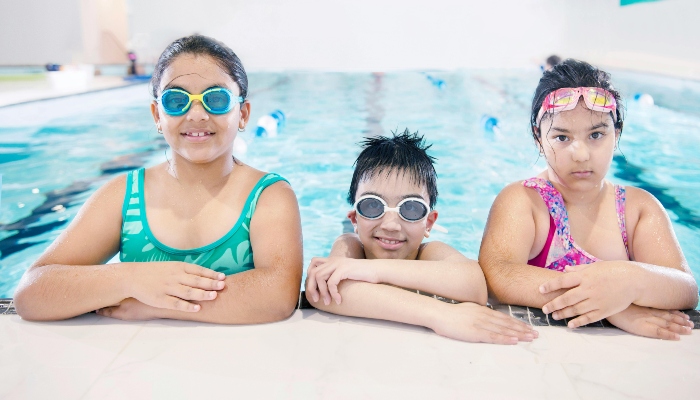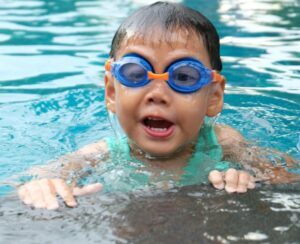Swimming Accidents: What Should You Do?

Swimming is a popular activity for all ages, whether indoors during cooler months or outdoors in the summer heat. It’s a chance to relax, have fun, and stay active. However, swimming accidents—including drowning—can happen anywhere, from pools to open water, and even in just a few inches of water. Understanding water safety is key to preventing injuries.
Swimming Pool Drowning Deaths and Kids
Drowning Deaths & Children: The Silent Danger
Drowning is quick, silent, and deadly, often occurring in as little as 20 to 60 seconds.
- Drowning is the leading cause of death for children aged 1 to 4 and the second-leading cause of accidental death for children 5 to 14 (after car accidents).
- Every year in the U.S., approximately 4,500 fatal drownings occur—an average of 11 drowning deaths per day—along with 8,000 nonfatal drownings.
- For every child under 18 who drowns, another seven receive emergency medical care for nonfatal drowning injuries.
- Most drownings in children ages 1 to 4 occur in swimming pools.
- 23% of child drownings happen during a family gathering near a pool.
Sources: CDC and Stop Drowning Now.
What leads to Swimming Accidents?
This is just a short list of what can lead to a swimming accident.
- Lack of swimming ability
- Lack of or improper barriers (such as fencing) around the pool
- Lack of close supervision
- Inadequately trained lifeguards
- Failure to wear a life jacket
- Alcohol consumption
- Ease of access to the pool area
- Poor maintenance of the pool and the surrounding area
- Defective or faulty equipment (i.e., slides, ladders, diving boards)
- Chemicals used for pool water care
Swimming Accident Injuries
Non-fatal swimming injuries can be severe and result in long-term disabilities, memory problems, and permanent disfigurement, along with injuries such as:
- Traumatic Brain Injuries (TBIs) occur when the brain is deprived of oxygen from being underwater for too long. They are also caused by blows to the head, resulting in brain swelling and loss of function.
- Spinal cord injuries (SCIs) occur when vertebrae are cracked or shattered from diving into shallow water, hitting the side of the pool, or striking a diving board.
- Slip and fall injuries
- Broken or fractured bones
- Internal bleeding and/or damage to the organs
- Electrocution from faulty wiring
- Chemical burns from unsafe pool treatments
Think Swimming Safety
Protect yourself and others with smart swimming practices:
Enjoy your time at the pool or beach, but never forget that drownings are a leading cause of injury death for young children ages one to 14. Adults can play a role in protecting children from drowning.
What to Do After a Swimming Accident?
As with any accident, the first priority is to obtain medical treatment for anyone who has been injured and ensure the safety of everyone else. Depending on the severity, call emergency services immediately.
Gather important evidence.
- Grab a camera and take pictures of where the accident occurred from as many different angles as possible. Pictures should include things such as warning signs, pool equipment, fences, and gates, and any pertinent evidence of the accident.
- Write down the names, addresses, and contact information for any witnesses.
- Gather any evidence. This could include any defective products, for instance. Agree on who will keep the evidence to ensure it does not accidentally get destroyed.
- Document, document, document! Memories tend to fade. Take the time to write down the details of what happened. What do you recall? What was happening immediately before the accident? How did it occur? Who was involved? What do the witnesses recall about the accident?
- Keep copies of all documents related to the accident. That includes medical treatments, police reports, and even any lost work time.
- Continue to seek medical treatment as advised for the recovery phase.
- Limit what you say and refrain from giving statements to anyone. Don’t post to social media. Best advice: speak with an attorney who will protect your legal rights, provide you with expert legal advice as to whether you have a personal injury case, and guide you on the next steps to take.
Need Additional Information?
How Can We Help You?

Source: Kzenon(Arne Trautmann) via depositphotos.com;
Receive a Free Evaluation from Experienced Personal Injury Attorneys
Unfortunately, young children tend to be the victims of many swimming pool accidents, so you and your family need to understand your legal options and obtain legal advice as soon as possible.
Contact our experienced personal injury attorneys for a free, no-obligation review of your case at (877) 284-6600.
Start Your Free Case Evaluation Review Today
Just Want to Stay Up-to-Date?
Sign up for Our Email Newsletter
If you would like to receive news and blog updates regularly, sign up to receive our email newsletter. Your email address will only be used to send you our newsletter and respond to inquiries.
SIGN UP FOR NEWSLETTER
Past results afford no guarantee of future results, and each case is different and is judged on its own merits. The choice of a lawyer is an important decision and should not be based solely upon advertisements.
Source of feature photo by Jacob Yavin – Image file. via pexels.com; Source of inset photos by Porapak Apichodilok – Image file. via pexels.com; and Kzenon(Arne Trautmann). Image file. via depositphotos.com;
Editor’s Note: This post was originally published June 20, 2019. It was reviewed on June 23, 2025, updated for content and accuracy, and re-published.
Related


